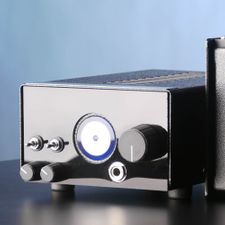Photo CC by Martin Fisch on Flickr
How to build an audience when you loath marketing and self-promotion
Elissa Milne had an interesting article on her blog the other day about audience building, essentially advancing the claim that you build an audience for new music in the same way you build an audience for anything, be it an opera company or a rock band. This is true, but it doesn’t help most musicians—especially new music musicians. It’s very rare to find a person who both creates appealing new music at a high level and has a knack for marketing and self-promotion. Beating the drum of “learn how to sell your music” is technically correct, but it’s also an unrealistic expectation for the vast majority of new music practitioners. So what’s a more practical solution?
Shortcut: Winning the Lottery
Milne’s solution is essentially the same one espoused by most entrepreneurs, startups, and grassroots organizations: you build an audience by getting the word out, and then producing something at a high level that people will care about. They won’t care automatically, and they won’t all care for the same reason, but generally it starts with people who have an interest in you already (read family and friends), expanding out to their circles of influence, and so forth. Social media is a cheap way to get a jump start on this type of approach, but do-it-yourself audience building was just as viable before the Internet, so it’s by no means obligatory to tweet and “like” your way to musical success.
Of course, there is another way to develop a successful, no-strings-attached musical career with a large following: you get “discovered”. This is the American Idol model of artistic success, and it happens in new music the same way it does in pop music. Every sizable local scene seems to pick a few “stars” per generation, and then larger national scenes will pick from these stars to represent the country, and so on up to international level. The odds of that happening to you are close to the odds of winning the lottery, but people do hit the jackpot.
Step 1: Establish your priorities
Let’s assume you didn’t win the lottery. By now you probably know that a career in new music doesn’t pay that well, so you’ve got two major obstacles to overcome: how to pay the rent, and how to keep on making music. (There are larger issues behind both of these goals, but let’s leave it at that for now.) Secondary to that is how much you care about the audience. Some people just care about getting a perfected, refined project off the ground, and as long as a few people show up, they’re happy. Others are not satisfied unless they see a growing audience for their work, and they may be more willing to compromise some degree of artistic perfection at the outset for the greater good of generating buzz around their work.
So the first question to ask is whether the audience actually matters to you, and where you fall between those extremes. You’re not hurting anyone or destroying the fabric of society by playing to empty rooms, so if you don’t want to bother with the question of audiences, make peace with that reality and go about your musical life.
On the other hand, if you make music primarily so that others will hear it, you need to decide who you want to hear it and how you’ll get them to bother coming to your performances. Maybe you work as a professor, so you attract people by doing concerts in academia. Maybe you’re a piano teacher, so you invite students and their families. Or maybe you work an office job, shamelessly promote yourself online, spam all your friends, and get some of them to come to your concert. All of these work.
The key is finding that sweet spot where the amount of effort vs. size of the audience is in balance for you: the point where if you worked harder on promotion, you’d lose the motivation to make music, but you do have some people coming to your concerts because of the promotion you are doing. Once you find that point, it’s perfectly fine to stay at that level if you’re satisfied with it, there’s no need to keep on pushing.
Step 2: Collaborate with others
Unfortunately, you may come to a point where you crave greater recognition as an artist but you know that if you work harder on self-promotion, you risk burning yourself out. At this stage, logging onto Facebook fills you with procrastination-inducing dread, and you find yourself with a permanent background feeling of guilt.
The solution to this problem is to team up with someone else. Collaboration is built into our DNA at a very basic level; it’s part of the reason we evolved into the successful species that we are. Look at the history of anything and you’ll see that when you work with others you get more done. Most musicians work alone because we’ve been conditioned that way through countless hours spent alone with our instruments, so this collaborative attitude is a paradigm shift for many of us. But it remains true that the best way to build an audience is to do it with someone else.
Naturally, people have different proclivities and talents. You might obsessively read and post to Twitter all day long between other tasks without having to put much effort into it. That’s great, that’s a valuable talent you can bring to the table. Lots of other musicians don’t feel that way, so you can do the social media for both of you and they can do something in return that helps you.
Find a network of collaborators in this way: a grant writer, a gig hustler, a score preparer, a graphic designer—whatever you happen to need. You’ll get a lot more done because (1) you’re not killing your productivity by stressing about not being good enough at X, (2) you’ll be doing things you’re actually good at much of the time, and (3) you won’t be wasting your energy.
Step 3: Get hired help
At first, your collaborations will probably be informal, but at some point you may find that it’s worth hiring someone. Eventually your collaborations will lead to you having too many projects going on to manage as a group, and you will all get stressed, despite the productivity gains you saw in Step 2. This will probably also be at about the time where you’ve almost stopped losing money doing music. Your audience will have grown to a few people that you don’t know and have never met, and it’s not as hard anymore to get people into a room.
This is the point where it make sense to hire someone. Start by hiring for tasks that don’t require a lot of specialized expertise, like booking rehearsals. An admin assistant will give you sanity and let you take your audience building to the next level. You’ll start making more money again and your audiences will grow even larger. Eventually you might want to look into an agent or a publisher, but also keep in mind that by the time you really need one, they will usually come knocking on your door. You’ll get better terms if you wait them out than if you go chasing after them, so it’s almost always best to hire down than to hire up. (NB: There are a few notable exceptions; for instance, most classical singers sign with an agent somewhere in Step 1 or 2.)
Once you reach this level, you don’t need my advice anymore (I’d be happy to listen to any pointers you have for me though…). But from what I have seen and experienced, this is the tried and true method of building an audience, independent of technology, your marketing acumen, or your interests as an artist. Successful artists are collaborative artists, there’s no other way around it. Those who end up developing a following do so by building a network of colleagues around them that they can exchange skills with. Nobody can do everything by themselves.


